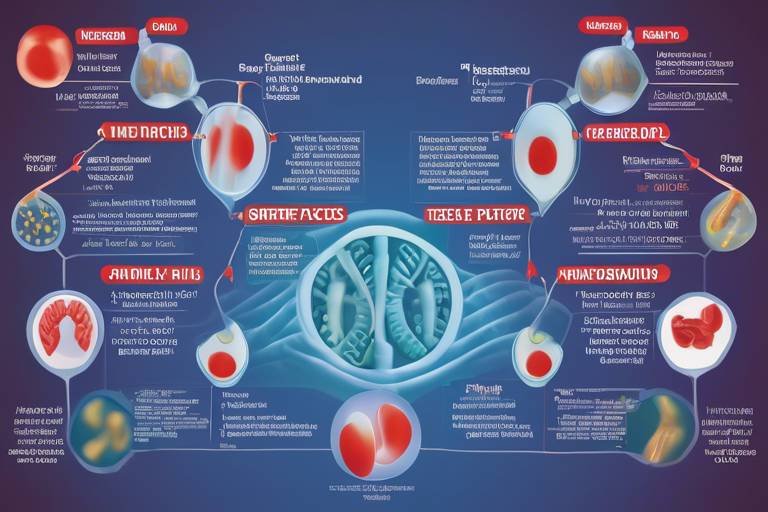How Technology is Transforming Mental Health Treatment
In today's fast-paced world, technology is not just a tool; it's a lifeline for many, especially when it comes to mental health treatment. The digital age has ushered in a wave of innovative solutions that are reshaping how we approach mental health care. Imagine being able to access therapy from the comfort of your home or having a personal wellness coach right in your pocket. This is not just a dream; it's the reality for countless individuals seeking support and healing.
The integration of technology in mental health care has made it more accessible than ever before. No longer do you have to wait weeks for an appointment or travel long distances to see a specialist. With just a few clicks, you can connect with a therapist, explore self-help resources, or even engage in therapeutic activities through various platforms. This accessibility is crucial, especially for those living in remote areas or facing mobility challenges.
Moreover, technology is enhancing treatment outcomes significantly. With the help of data analytics, mental health professionals can now tailor treatment plans to the individual needs of their patients. This personalized approach is akin to having a custom-made suit; it fits just right and addresses specific needs, rather than a one-size-fits-all solution. As we delve deeper into this article, we will explore various facets of how technology is transforming mental health treatment, from teletherapy and mobile apps to the use of artificial intelligence.
So, are you ready to dive into the exciting world of mental health technology? Let’s unravel how these advancements are not just changing the landscape of mental health care but are also paving the way for a brighter, more supportive future for those in need.
Teletherapy has gained immense popularity, offering patients the convenience of remote therapy sessions. Imagine being able to sit in your favorite chair, cup of tea in hand, while discussing your feelings with a professional who is miles away. This section discusses its benefits, challenges, and how it has become a vital resource for mental health care.
Mental health apps are revolutionizing self-care practices. With a plethora of applications available, users can now access tools that empower them to manage their mental health proactively. From mood trackers to cognitive behavioral therapy (CBT) exercises, these apps provide a range of functionalities designed to support emotional well-being.
Mindfulness and meditation apps have surged in popularity, providing guided practices to enhance emotional well-being. These apps can be likened to having a personal coach in your pocket, ready to guide you through a calming meditation or help you focus on the present moment. This subsection explores their impact on stress reduction and overall mental health improvement.
Some of the most popular mindfulness apps include:
- Headspace: Offers a variety of guided meditations tailored to different needs.
- Calm: Focuses on sleep stories, meditation, and relaxation techniques.
- Insight Timer: Features a vast library of free guided meditations from various teachers.
Research shows that consistent meditation practice can lead to significant mental health benefits. Studies indicate that individuals who meditate regularly report lower levels of anxiety and depression. This section discusses the scientific findings that support the effectiveness of these practices, highlighting how even a few minutes of meditation each day can transform one’s mental state.
Gamification is emerging as an innovative approach in therapy, making treatment engaging and interactive. Think of it as turning your therapy sessions into a game where you earn points for completing tasks and challenges. This subsection discusses how game elements can motivate patients and enhance their therapeutic experience.
AI technologies are transforming diagnosis in mental health by providing more accurate assessments. With the ability to analyze vast amounts of data quickly, AI tools can assist clinicians in identifying patterns and making informed decisions about treatment. This section explores how AI tools are being integrated into clinical practices to improve patient outcomes.
AI-powered chatbots serve as accessible mental health resources, offering immediate support to users. Imagine having someone to talk to 24/7, ready to listen and provide guidance. However, this subsection also discusses the potential limitations of relying on technology for mental health, emphasizing the importance of human connection in therapy.
Predictive analytics is changing how mental health professionals approach treatment plans. By analyzing data trends, clinicians can develop personalized care strategies that cater to the unique needs of each patient. This section examines how data analysis can lead to better patient management and improved therapeutic outcomes.
The future holds promising advancements in mental health technology. As we continue to explore new innovations, the potential for enhanced effectiveness in mental health treatment grows. This section speculates on upcoming trends, such as virtual reality therapy and advanced AI diagnostics, that could further revolutionize the landscape of mental health care.
Q: How can I find a teletherapist?
A: You can search online directories, ask for recommendations from friends, or check with your insurance provider for covered teletherapy options.
Q: Are mental health apps effective?
A: Yes, many studies have shown that mental health apps can be effective tools for managing symptoms and enhancing well-being when used consistently.
Q: Is AI in mental health safe?
A: While AI can enhance diagnosis and treatment, it should complement, not replace, human therapists to ensure comprehensive care.

The Rise of Teletherapy
In recent years, teletherapy has emerged as a game-changer in the field of mental health treatment. Imagine being able to attend therapy sessions from the comfort of your own home, without the stress of commuting or waiting in a crowded office. This innovative approach offers patients the convenience they crave, making mental health care more accessible than ever. Teletherapy has gained immense popularity, particularly during the pandemic, as people sought ways to maintain their mental well-being amidst unprecedented challenges.
One of the most significant benefits of teletherapy is its ability to break down geographical barriers. No longer are individuals limited to therapists within their immediate vicinity. With just a few clicks, patients can connect with qualified professionals from around the world. This is particularly beneficial for those living in remote areas or for individuals who may have mobility issues. The flexibility of scheduling is another advantage; clients can arrange sessions at times that suit their busy lives, making mental health care a priority without the hassle of traditional appointments.
However, as with any new approach, teletherapy comes with its own set of challenges. Technical difficulties can arise, such as poor internet connections or unfamiliarity with video conferencing tools. Additionally, some patients may find it difficult to open up in a virtual setting, missing the personal touch that in-person interactions provide. Despite these challenges, many mental health professionals have adapted their practices to ensure that clients still receive the support they need.
To further understand the impact of teletherapy, let's look at some key statistics:
| Statistic | Percentage |
|---|---|
| Patients using teletherapy during the pandemic | 76% |
| Patients who reported satisfaction with teletherapy | 85% |
| Therapists offering teletherapy services | 90% |
These numbers highlight a significant shift in how therapy is delivered, with many patients finding teletherapy to be a viable alternative to traditional face-to-face sessions. The positive feedback from clients indicates that teletherapy is not just a temporary solution but could be a lasting component of mental health care.
As we look to the future, it's clear that teletherapy will continue to play a crucial role in mental health treatment. With ongoing advancements in technology, we can expect even more innovative solutions that enhance the teletherapy experience. Whether through improved platforms or the integration of AI tools, the potential for growth is immense. In a world where mental health awareness is rising, teletherapy stands out as a beacon of hope, offering a lifeline to those in need.
In summary, the rise of teletherapy represents a significant transformation in mental health care, making it more accessible, flexible, and user-friendly. While challenges exist, the overall trend points towards a future where teletherapy becomes a staple in the therapeutic landscape, helping individuals find the support they need, whenever and wherever they need it.

Mobile Apps for Mental Wellness
In today's fast-paced world, mental wellness has become more crucial than ever, and what better way to promote it than through the power of technology? Mobile apps dedicated to mental health are reshaping how we approach self-care and emotional well-being. These apps are not just tools; they are companions on our journey toward better mental health. With just a few taps on our smartphones, we can access a wealth of resources designed to help us manage stress, anxiety, and depression.
One of the most significant advantages of these mobile applications is their accessibility. Gone are the days when seeking help meant scheduling a face-to-face appointment weeks in advance. Now, individuals can find support at their fingertips, any time of the day or night. Whether you're feeling overwhelmed at work or need a moment of calm during a hectic day, there’s likely an app tailored to your needs. Many of these apps are designed with user-friendly interfaces, making it easy for anyone to navigate and find the support they require.
Moreover, these apps empower users to take a proactive approach to their mental health. They often include features like mood tracking, guided journaling, and even interactive exercises that encourage self-reflection. For example, a user might log their feelings throughout the day, which can help identify patterns and triggers that contribute to their mental state. This level of self-awareness is invaluable in understanding one's emotions and developing better coping strategies.
Additionally, many mental wellness apps incorporate community support, allowing users to connect with others who may be experiencing similar challenges. This sense of community can be incredibly therapeutic, as it fosters a feeling of belonging and understanding. Users can share their experiences, offer advice, and even find accountability partners to help them stay committed to their mental health goals.
To give you a clearer picture, let’s take a look at some key functionalities that these apps typically offer:
| App Feature | Description |
|---|---|
| Mood Tracking | Allows users to log their emotions and identify patterns over time. |
| Guided Meditations | Offers audio or video sessions that help users practice mindfulness and relaxation techniques. |
| Journaling | Encourages users to write about their thoughts and feelings, promoting self-reflection. |
| Community Forums | Provides a platform for users to connect with others, share experiences, and offer support. |
However, while these apps offer numerous benefits, it’s important to remember that they are not a substitute for professional therapy. They are best used as complementary tools alongside traditional treatment methods. For instance, someone might find that using a mental wellness app helps them manage anxiety between therapy sessions, providing ongoing support and resources.
In conclusion, mobile apps for mental wellness are revolutionizing how we approach mental health care. They offer a blend of accessibility, empowerment, and community support that can significantly enhance our emotional well-being. As we continue to embrace the digital age, these tools will undoubtedly play a vital role in promoting mental health awareness and providing resources for those seeking help.

Mindfulness and Meditation Apps
In today's fast-paced world, where stress and anxiety often feel like unwelcome companions, mindfulness and meditation apps have emerged as a beacon of hope for many. These digital tools are not just trendy; they offer practical solutions to enhance emotional well-being and foster a sense of calm amid chaos. Imagine having a personal meditation guide right in your pocket, available at any hour of the day! It's like having a soothing voice whispering in your ear, reminding you to breathe and be present.
These apps typically feature a variety of guided practices, ranging from short breathing exercises to longer meditative sessions, tailored to fit into even the busiest schedules. Users can engage in mindfulness practices that help ground them in the moment, making it easier to navigate life's challenges. The beauty of these platforms lies in their accessibility—no need for a yoga studio or a meditation retreat; you can find peace in the comfort of your own home.
Moreover, many mindfulness and meditation apps employ innovative techniques to keep users engaged. For instance, they often incorporate gamification elements—think points, badges, or progress tracking—to motivate users to stick with their practice. This approach not only makes meditation feel less daunting but also transforms it into a rewarding experience. The idea is simple: the more you meditate, the more you benefit, and the more you want to continue. It’s a win-win situation!
But how effective are these apps, really? Research has shown that consistent use of mindfulness and meditation apps can lead to significant improvements in mental health. Studies indicate that users often report reduced levels of stress, anxiety, and even symptoms of depression. These findings suggest that these digital tools can be a valuable addition to traditional therapeutic approaches, offering a complementary method for managing mental health.
In summary, mindfulness and meditation apps are revolutionizing how we approach self-care. They empower users to take charge of their mental health, providing resources that are both effective and convenient. As technology continues to advance, we can expect these apps to evolve further, offering even more personalized experiences that cater to individual needs. So, whether you're a seasoned meditator or just starting your journey, these apps can be a fantastic resource for finding your inner peace.
- What are some popular mindfulness and meditation apps? Some of the most popular options include Headspace, Calm, and Insight Timer, each offering unique features and guided sessions.
- Can I use these apps for free? Many mindfulness apps offer free versions with limited features, while premium subscriptions unlock additional content and functionalities.
- How long should I meditate each day? Even just a few minutes of meditation daily can be beneficial. It's more about consistency than duration.
- Are these apps suitable for beginners? Absolutely! Most apps provide beginner-friendly sessions and guidance to help you ease into meditation.

Popular Mindfulness Apps
In today's fast-paced world, finding moments of calm can feel like searching for a needle in a haystack. Thankfully, mindfulness apps are here to help! These digital tools not only make practicing mindfulness more accessible but also cater to various needs and preferences. Whether you're a beginner or a seasoned meditator, there's an app designed just for you. Let's dive into some of the most popular mindfulness apps that are making waves in the mental wellness space.
Headspace is often at the top of the list when it comes to mindfulness apps. With its user-friendly interface and vibrant animations, it transforms meditation into an engaging experience. Users can choose from a variety of themed sessions, such as stress relief, sleep, and focus. The app also offers a unique "Sleepcasts" feature, which provides soothing narratives to help users drift off to sleep.
Another noteworthy contender is Calm. This app takes a holistic approach to mental wellness by combining meditation with music, sleep stories, and breathing exercises. The gentle sounds of nature and calming music create an immersive environment, making it easier for users to unwind. Plus, Calm's "Daily Calm" feature delivers a new meditation each day, ensuring that users always have fresh content to explore.
For those who enjoy a more structured approach, Insight Timer offers an extensive library of guided meditations, music tracks, and talks from mindfulness experts. What sets this app apart is its community aspect; users can connect with others, share experiences, and even join group meditations. This fosters a sense of belonging, which is crucial for mental health.
If you're looking for something a bit different, consider 10% Happier. This app is geared towards skeptics of meditation, providing practical, no-nonsense guidance. It features courses led by renowned meditation teachers, focusing on how to integrate mindfulness into everyday life. With a blend of humor and straightforward advice, it makes mindfulness approachable for everyone.
Lastly, Smiling Mind is an excellent choice for younger audiences. Developed by psychologists and educators, this app offers mindfulness programs tailored for different age groups, including children and adolescents. By teaching mindfulness in a relatable way, it helps younger users build resilience and emotional intelligence from an early age.
In summary, these mindfulness apps not only provide valuable resources for managing stress and enhancing emotional well-being but also encourage users to cultivate a regular mindfulness practice. With their unique features and approaches, they empower individuals to take charge of their mental health, making mindfulness a part of their daily routine. So, if you're ready to embark on a journey of self-discovery and tranquility, consider downloading one of these popular mindfulness apps today!
Q: Are mindfulness apps effective for mental health?
A: Yes, many studies suggest that mindfulness apps can help reduce stress, anxiety, and improve overall emotional well-being. They provide users with tools and resources to practice mindfulness regularly.
Q: Do I need to pay for these apps?
A: While many mindfulness apps offer free versions with limited features, most also have premium subscriptions that unlock additional content and functionalities.
Q: Can mindfulness apps help with sleep issues?
A: Absolutely! Many mindfulness apps include specific features designed to promote better sleep, such as guided sleep meditations and soothing sounds.
Q: How do I choose the right mindfulness app for me?
A: Consider your personal preferences, such as the type of content you enjoy (guided meditations, music, etc.), your experience level, and whether you prefer a community aspect. Trying out a few different apps can help you find the right fit!

Effectiveness of Meditation Practices
Meditation practices have been around for centuries, but only recently have they gained significant attention in the realm of mental health. Research has shown that regular meditation can lead to profound improvements in emotional well-being and overall mental health. Imagine your mind as a busy highway, filled with honking cars and chaotic traffic. Meditation acts like a traffic signal, helping to regulate the flow of thoughts and emotions, allowing for a smoother ride through life’s challenges.
Studies indicate that consistent meditation can reduce symptoms of anxiety and depression, enhance focus, and promote a greater sense of calm. For instance, a meta-analysis published in a reputable psychology journal found that mindfulness meditation significantly decreases anxiety levels in participants. This is not just anecdotal evidence; it's a growing body of scientific research that underscores the effectiveness of these practices.
Furthermore, meditation has been linked to changes in brain structure and function. Research conducted by neuroscientists has shown that regular meditation can increase the thickness of the prefrontal cortex, the area of the brain responsible for executive functions such as decision-making, emotional regulation, and self-awareness. This means that not only can meditation help you feel better in the moment, but it can also lead to long-term cognitive benefits.
To better understand the effectiveness of meditation practices, let’s break down some key benefits:
- Stress Reduction: Meditation is renowned for its ability to lower stress levels. By focusing on the present moment, individuals can detach from the worries of the past and future.
- Enhanced Emotional Health: Regular practitioners often report improved mood and emotional resilience, making it easier to cope with life's ups and downs.
- Better Concentration: Meditation trains the mind to focus, which can lead to improved attention span and productivity.
- Increased Self-Awareness: Many forms of meditation encourage self-reflection, fostering a deeper understanding of oneself and one’s thoughts.
In conclusion, the effectiveness of meditation practices is supported by a wealth of scientific evidence and personal testimonies. As we continue to explore the intersection of technology and mental health, incorporating meditation into our daily routines can serve as a powerful tool for enhancing our emotional well-being. Whether you're a seasoned meditator or just starting, the benefits are accessible to everyone. So why not take a moment to pause, breathe, and center yourself? After all, in this fast-paced world, a little mindfulness can go a long way.
Q1: How long should I meditate each day?
A1: Even a few minutes of meditation can be beneficial. Aim for at least 10-15 minutes daily to start seeing significant effects.
Q2: Do I need to sit in silence to meditate?
A2: Not necessarily. While traditional meditation often involves silence, there are various forms, including guided meditations and mindfulness practices that can be done in everyday activities.
Q3: Can meditation replace therapy?
A3: Meditation can complement therapy but should not be considered a replacement for professional mental health treatment when needed.
Q4: What if I can't quiet my mind during meditation?
A4: It's normal for thoughts to arise during meditation. The key is to acknowledge them without judgment and gently bring your focus back to your breath or mantra.

Gamification in Therapy
Gamification in therapy is like adding a splash of color to a black-and-white painting; it transforms the experience from mundane to engaging. Imagine a world where therapy sessions feel less like a chore and more like an exciting game. This innovative approach incorporates game-like elements into therapeutic practices, making them not only more enjoyable but also more effective. By introducing points, challenges, and rewards, therapists can motivate patients to participate actively in their healing journey. It’s a bit like turning personal growth into a thrilling adventure, where every small achievement is celebrated and contributes to the overall progress.
One of the most significant advantages of gamification in therapy is its ability to foster **engagement**. Traditional therapy can sometimes feel daunting or overwhelming, leading to a lack of motivation. However, by integrating game mechanics, patients are encouraged to take ownership of their mental health. For instance, completing tasks or achieving milestones can yield rewards, which not only boosts morale but also instills a sense of accomplishment. This method can be particularly beneficial for younger patients or those who struggle to connect with standard therapeutic practices.
Moreover, gamification can enhance **skill-building** in a fun and interactive way. Patients can practice coping strategies, mindfulness, or social skills through engaging activities that simulate real-life scenarios. For example, a virtual reality game could allow a patient to confront their fears in a controlled environment, making the therapeutic process feel less intimidating. This immersive experience can lead to better retention of skills and techniques, as patients are more likely to remember what they learned in an enjoyable context.
However, while gamification holds great promise, it’s essential to approach it with caution. Not every game will resonate with every patient, and the therapeutic relationship should remain at the forefront of treatment. Therapists must carefully select or design gamified elements that align with the individual’s needs and preferences. Striking the right balance between fun and therapeutic value is crucial; otherwise, the game can overshadow the therapy itself.
In conclusion, gamification in therapy is an exciting frontier that has the potential to revolutionize mental health treatment. By blending the principles of game design with therapeutic practices, we can create a more engaging and effective healing experience. As we continue to explore this innovative approach, it’s essential to keep the focus on the patient’s journey, ensuring that therapy remains a supportive and enriching experience.

Artificial Intelligence in Diagnosis
Artificial Intelligence (AI) is revolutionizing the field of mental health by offering innovative solutions that enhance the accuracy and efficiency of diagnoses. Imagine walking into a therapist's office, and instead of a lengthy questionnaire, a sophisticated AI tool analyzes your responses in real-time, providing insights that a human might miss. This is not just a dream; it's the reality that AI is bringing to mental health care.
The integration of AI technologies into clinical practices is transforming how mental health professionals assess and treat patients. AI can analyze vast amounts of data from various sources—such as patient history, behavioral patterns, and even social media activity—to identify potential mental health issues. This data-driven approach allows for more precise diagnostics, leading to tailored treatment plans that cater to the unique needs of each individual.
One significant advantage of AI in diagnosis is its ability to reduce human bias. Traditional diagnostic methods can be influenced by a therapist's perceptions or experiences, which may lead to misdiagnoses. However, AI algorithms are designed to be objective, relying solely on data. This objectivity can enhance the reliability of diagnoses, ensuring that patients receive the most appropriate care from the outset.
Moreover, AI tools can also facilitate early detection of mental health disorders. For instance, predictive analytics can identify subtle changes in a person's behavior or mood over time, alerting healthcare providers to potential issues before they escalate. This proactive approach not only improves patient outcomes but also helps in reducing the overall burden on mental health services.
While the benefits of AI in diagnosis are compelling, it is essential to acknowledge the challenges that come with it. Privacy concerns are paramount, as sensitive patient data is often required for AI systems to function effectively. Ensuring that this data is protected and used ethically is crucial in maintaining trust between patients and healthcare providers. Additionally, there is the concern of over-reliance on technology, which could lead to a reduction in human interaction—a vital component of effective mental health care.
To give you a clearer picture of how AI is shaping the landscape of mental health diagnosis, consider the following table:
| AI Tool | Functionality | Benefits |
|---|---|---|
| Chatbots | Provide immediate support and preliminary assessments | Accessible 24/7, reduce waiting times for patients |
| Predictive Analytics | Analyze behavioral data for early detection | Personalized treatment plans, proactive care |
| Natural Language Processing | Understand and interpret patient language | Enhanced communication, identifying underlying issues |
As we look to the future, the potential for AI in mental health diagnosis is vast. With ongoing advancements in technology, we can expect even more sophisticated tools that not only improve accuracy but also enhance the overall patient experience. The challenge lies in balancing these innovations with the essential human touch that defines effective mental health care.
- How does AI improve mental health diagnosis? AI enhances diagnosis by analyzing large data sets, identifying patterns, and providing objective assessments that reduce human bias.
- Are AI tools safe for patient data? While AI tools can be secure, it is crucial for healthcare providers to implement strong privacy measures to protect sensitive patient information.
- Will AI replace therapists in mental health care? No, AI is designed to assist and enhance the diagnostic process, not replace the essential human connection that therapists provide.

AI-Powered Chatbots
In recent years, have emerged as a revolutionary tool in the field of mental health. Imagine having a supportive friend available 24/7, ready to listen to your concerns or provide guidance whenever you need it. That's the essence of what these chatbots offer. They are designed to simulate human conversation, providing immediate support and resources for individuals seeking help. But how effective are they, and what should we know about their role in mental health care?
One of the most significant advantages of AI chatbots is their accessibility. Unlike traditional therapy, which may require scheduling appointments and commuting to a therapist’s office, chatbots are available at any time and from any location. This is particularly beneficial for individuals who may feel anxious about seeking help or those who live in remote areas where mental health resources are scarce. With just a few taps on a smartphone, users can engage in a conversation that feels personal and supportive.
However, while chatbots can provide immediate assistance, it’s essential to understand their limitations. They are not a replacement for professional therapy but rather a supplementary resource. For example, chatbots can help users manage anxiety or depression by offering coping strategies, mindfulness exercises, or even just a friendly chat. Yet, they lack the ability to diagnose complex mental health issues or provide the nuanced understanding that a trained therapist can offer. This distinction is crucial for users to grasp, as relying solely on a chatbot for serious mental health concerns may not be advisable.
Moreover, the technology behind these chatbots is continually evolving. Many are now equipped with natural language processing capabilities, allowing them to understand and respond to user inputs more effectively. This means that the more you interact with a chatbot, the better it becomes at tailoring responses to your specific needs. Some chatbots even employ machine learning algorithms to improve their interactions over time, making them more adept at providing relevant support.
As we explore the impact of AI-powered chatbots in mental health, it's also essential to consider user experiences. Many users report feeling a sense of relief and comfort when using these tools. They appreciate the anonymity and non-judgmental space that chatbots provide. However, there are also concerns regarding privacy and data security, as users share personal information during their interactions. Developers of these chatbots must prioritize user confidentiality and ensure that data is handled responsibly.
In conclusion, while AI-powered chatbots are not a panacea for mental health challenges, they represent a significant step forward in making mental health resources more accessible. They offer a novel way for individuals to engage with their mental health proactively. As technology continues to advance, we can expect these chatbots to become even more sophisticated, providing users with enhanced support and guidance. The key lies in understanding their role as a complement to traditional therapy rather than a replacement.
- Are AI-powered chatbots effective for mental health support? Yes, they can provide immediate assistance and coping strategies but should not replace professional therapy.
- Can chatbots diagnose mental health conditions? No, chatbots cannot diagnose conditions; they are designed to offer support and resources.
- How do I ensure my data is safe when using a chatbot? Look for chatbots that prioritize user privacy and have robust data protection measures in place.

Predictive Analytics in Treatment
Predictive analytics is a game-changer in the realm of mental health treatment, enabling professionals to tailor their approaches based on data-driven insights. Imagine walking into a therapist's office and having them already understand your unique needs before you even say a word. That’s the power of predictive analytics! By analyzing vast amounts of data from various sources, including patient history, treatment responses, and even demographic information, mental health professionals can make informed decisions that significantly enhance treatment effectiveness.
This innovative approach allows clinicians to identify patterns and predict outcomes, leading to more personalized care strategies. For instance, if a patient has a history of anxiety and depression, predictive analytics can help determine which treatments have been most effective for similar individuals. This not only saves time but also improves the chances of successful outcomes. The integration of these analytics into clinical practices is akin to having a compass in a dense forest; it guides clinicians through the complexities of mental health care.
Moreover, predictive analytics can help in monitoring patient progress over time. By continuously analyzing data, therapists can spot early signs of relapse or deterioration in mental health, enabling timely interventions. This proactive approach is essential in mental health treatment, where conditions can change rapidly. For example, a patient who initially responds well to therapy might later experience setbacks. With predictive analytics, therapists can adjust treatment plans swiftly, ensuring that patients receive the support they need when they need it the most.
However, while the benefits are substantial, there are challenges that come with implementing predictive analytics in mental health care. One major concern is the ethical implications of data privacy. Patients must feel confident that their information is secure and used responsibly. Additionally, the reliance on data could inadvertently lead to a one-size-fits-all approach if not carefully managed. Therefore, it’s crucial for mental health professionals to balance data-driven insights with the human element of therapy. After all, mental health care is not just about numbers; it’s about understanding and empathy.
In conclusion, predictive analytics is reshaping the landscape of mental health treatment, offering a pathway to more personalized and effective care. As technology continues to evolve, we can expect even more sophisticated tools to emerge, further enhancing the ability of mental health professionals to support their patients. The future is bright, and with these advancements, we can hope for a world where mental health treatment is not only more effective but also more accessible to those in need.
- What is predictive analytics in mental health treatment?
Predictive analytics involves using data analysis to identify patterns and predict outcomes in mental health treatment, allowing for more personalized care strategies.
- How does predictive analytics benefit patients?
It helps clinicians tailor treatment plans based on individual data, monitor progress, and make timely adjustments, ultimately improving patient outcomes.
- Are there any risks associated with predictive analytics?
Yes, concerns around data privacy and the potential for a one-size-fits-all approach are significant challenges that need to be addressed.

The Future of Mental Health Technology
As we look towards the horizon of mental health technology, it’s clear that the landscape is evolving at an unprecedented pace. The integration of cutting-edge technologies is not just a trend; it’s a revolution that promises to enhance the way we understand, diagnose, and treat mental health issues. Imagine a world where mental health care is as accessible as checking your email or scrolling through social media. This isn’t just a dream; it’s becoming a reality thanks to advancements in various technological fields.
One of the most exciting prospects is the development of wearable technology. Devices that monitor physiological indicators such as heart rate, sleep patterns, and even brain activity can provide valuable insights into a person's mental health. For instance, a smartwatch could detect signs of anxiety or depression by analyzing changes in heart rate variability, prompting users to engage in mindfulness exercises or seek professional help. This real-time monitoring could be a game-changer in early intervention strategies, allowing individuals to take charge of their mental well-being proactively.
Furthermore, the rise of virtual reality (VR) therapy is opening new doors for treatment. Imagine stepping into a fully immersive environment where you can confront your fears in a safe space, guided by a therapist. VR therapy has shown promising results in treating conditions such as PTSD and phobias, providing a unique platform for exposure therapy. As the technology becomes more accessible and affordable, it could transform traditional therapeutic practices, making them more engaging and effective.
Artificial intelligence is also set to play a pivotal role in the future of mental health treatment. With the ability to analyze vast amounts of data, AI can help create personalized treatment plans tailored to the unique needs of each patient. By assessing patterns in behavior and responses to previous treatments, AI tools can suggest interventions that have a higher likelihood of success. This not only streamlines the treatment process but also enhances the overall patient experience by ensuring that care is specifically designed for them.
Moreover, the potential for community-based support platforms is growing. Online forums and support groups, powered by technology, create spaces where individuals can share their experiences, find encouragement, and receive guidance from both peers and professionals. These platforms can bridge the gap between formal therapy sessions, providing continuous support and fostering a sense of belonging among users. The social aspect of mental health care is crucial, and technology is making it easier than ever to connect with others who understand.
As we embrace these advancements, it’s essential to remain vigilant about the ethical implications and privacy concerns that come with the use of technology in mental health. Ensuring that patient data is protected and used responsibly will be paramount in maintaining trust in these innovative solutions. With the right balance, the future of mental health technology holds incredible promise, offering new hope and healing to countless individuals.
- What role will AI play in mental health treatment? AI will assist in diagnosing mental health conditions more accurately and creating personalized treatment plans based on data analysis.
- How can wearable technology help with mental health? Wearable devices can monitor physiological signs and alert users to potential mental health issues, encouraging early intervention.
- What are the benefits of VR therapy? VR therapy allows individuals to confront fears in a controlled environment, making it effective for treating conditions like PTSD and phobias.
- Are online support groups effective? Yes, online support groups provide a sense of community and continuous support, which can be beneficial for mental health.
Frequently Asked Questions
- What is teletherapy and how does it work?
Teletherapy is a form of online therapy that allows individuals to connect with mental health professionals via video calls, phone calls, or chat. It offers flexibility and convenience, enabling patients to receive support from the comfort of their own homes. This approach has gained popularity, especially during times when in-person visits are challenging.
- Are mental health apps effective for self-care?
Yes, mental health apps can be quite effective for self-care. They provide tools for mindfulness, mood tracking, and guided exercises that empower users to take charge of their mental well-being. Many people find that these apps help them develop healthier habits and manage stress more effectively.
- What are some popular mindfulness and meditation apps?
Some popular mindfulness and meditation apps include Headspace, Calm, and Insight Timer. Each app offers unique features such as guided meditations, sleep aids, and mindfulness exercises tailored to different needs, making it easier for users to find what resonates with them.
- How does gamification enhance therapy?
Gamification enhances therapy by incorporating game-like elements such as rewards, challenges, and progress tracking into the treatment process. This approach makes therapy more engaging and interactive, motivating patients to participate actively in their healing journey.
- What role does artificial intelligence play in mental health diagnosis?
Artificial intelligence plays a significant role in mental health diagnosis by providing tools that analyze patient data and offer more accurate assessments. AI can help identify patterns and symptoms that may be overlooked, thus improving the overall diagnostic process and leading to better treatment plans.
- How do AI-powered chatbots assist individuals seeking mental health support?
AI-powered chatbots serve as accessible mental health resources, offering immediate support and guidance to individuals in need. They can provide information, suggest coping strategies, and even help users find professional help. However, it's important to remember that chatbots are not a substitute for professional therapy.
- What is predictive analytics and how does it benefit mental health treatment?
Predictive analytics involves analyzing data to forecast potential outcomes, which can significantly benefit mental health treatment. By understanding trends and patterns in patient behavior, mental health professionals can create personalized care strategies that cater to individual needs, ultimately improving patient management and outcomes.
- What can we expect in the future of mental health technology?
The future of mental health technology looks promising, with advancements such as improved AI diagnostics, more sophisticated mental health apps, and innovative treatment methods on the horizon. These developments aim to enhance accessibility and effectiveness, making mental health care more personalized and responsive to individual needs.



















